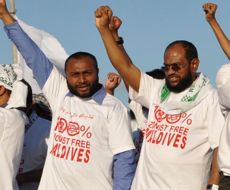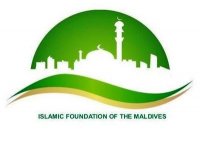The self-titled ‘National Movement’, comprising several NGOs and the religious conservative Adhalaath Party, has said it is exercising constitutional rights by holding gatherings at the artificial beach area in Male’, despite claims it has not been granted permission to do so.
State Finance Minister Abbas Adil Riza, a member of the National Movement’s Steering Committee, said the group’s followers had the right to freedom of assembly to express dissatisfaction with parliament. He also today (April 11) claimed the movement’s supporters may “storm” the People’s Majlis to protect the national constitution.
The National Movement has held a series of gatherings in recent weeks that its supporters have said are targeted solely at parliamentarians and their conduct in the country. The group previously accused MPs of violating the constitution late last year and said they would consider a plan to “break up” parliament if its members’ constitutional concerns were not addressed.
Housing Minister Dr Mohamed Muiz today turned to social media site Twitter to claim in Dhevehi that the ‘National Movement’ had not obtained permission to hold its gatherings in the artificial beach area beyond April 8 this year.
Dr Muiz was not responding to calls at time of press.
Meanwhile, Male’ City Council (MCC), which claims to be responsible for providing the artificial beach area to political parties, said it had filed separate cases with the Maldives Police Service and Anti-Corruption Commission (ACC) over continued use of the land by a group proclaiming themselves as the ‘National Movement’.
Permission obtained, “Most probably”
Abbas Adil Riza told Minivan News today that one of the NGOs making up the National Movement had “most probably” obtained permission to use the land.
“We are of the opinion that the constitution allows every citizen the right of peaceful assembly,” he said.
Abbas claimed that the artificial beach area was a part of the capital where the public were free to gather, adding that he did not believe use of the space would be an issue if no other parties or groups had reserved the area at the same time.
According to Abbas, if the artificial beach area could not be made available for the ‘National Movement’, then MCC Councillors were required to provide land in the capital where they could continue to host gatherings.
He alleged that the MCC had tried to block National Movement supporters from holding their meetings at the artificial beach.
“Singular objective”
Regarding the ongoing series of gatherings, Abbas said the ‘National Movement’ was focused on the “singular objective” of not allowing parliament to damage the functioning of the Maldives constitution.
“We have given them the same warning that we gave to [former President Mohamed] Nasheed,” he said. “We will try to storm the Majlis if we have to protect the constitution.”
In December 2011, former opposition parties – now members of President Dr Mohamed Waheed’s unity government – and a number of NGOs included in the ‘National Movement’ gathered in Male’ with thousands of people to “defend Islam”. Organisers said the rally was a response to what they alleged were the irreligious practices of former President Mohamed Nasheed’s government.
Nasheed’s government was controversially removed from office two months later following a mutiny by sections of the police and military.
Many of the parties in attendance at the “defend Islam” rally have taken cabinet posts in the new government.
Permit
Responding to Abbas’ claims today, MCC Councillor Mohamed Abdul Kareem claimed that the municipal council presently held the responsibility to provide permits for the use of the artificial beach area for events and gatherings.
He said that with work now being undertaken to ensure the area is ready for use around the time of presidential elections scheduled for September this year, the MCC had requested the land not be used at present by any political organisation or group.
Kareem went on to accuse the ‘National Movement’ of not being a registered organisation, but just a name used by Adhaalath Party President Sheikh Imran Abdullah for his own political ends.
He went on to allege that as a result of Sheikh Imran’s involvement with the movement, Housing Minister Muiz, who is also Secretary General of the Adhaalath Party, had previously provided permits for a limited period of time to use the artificial beach area for the gatherings.
Kareem also rejected accusations that the MCC had any involvement in attempts to try and block or sabotage the National Movement’s gatherings or work.
“Usfasgandu” dispute
The MCC has itself been locked in legal wrangling with the Housing Ministry over the last 13 months concerning its ability to lease an area of land known as “Usfasgandu” to the Maldivian Democratic Party (MDP) for use as a protest staging ground and other activities.
Usfasgandu was handed back to the MDP by the Male’ City Council last month.
The area was cordoned off by police in January after the High Court issued a warrant requesting the area be kept under police custody until it reached a verdict on the case.
Male’ City Council leased the Usfasgandu area to the ousted ruling party in March 2012, prompting repeated attempts by the government to reclaim the area on the grounds it was being used for criminal activity, including the practice of black magic.
The MDP had moved to the area after a previous protest camp at the tsunami monument was dismantled and completely repainted by police and military on March 19, 2012.

